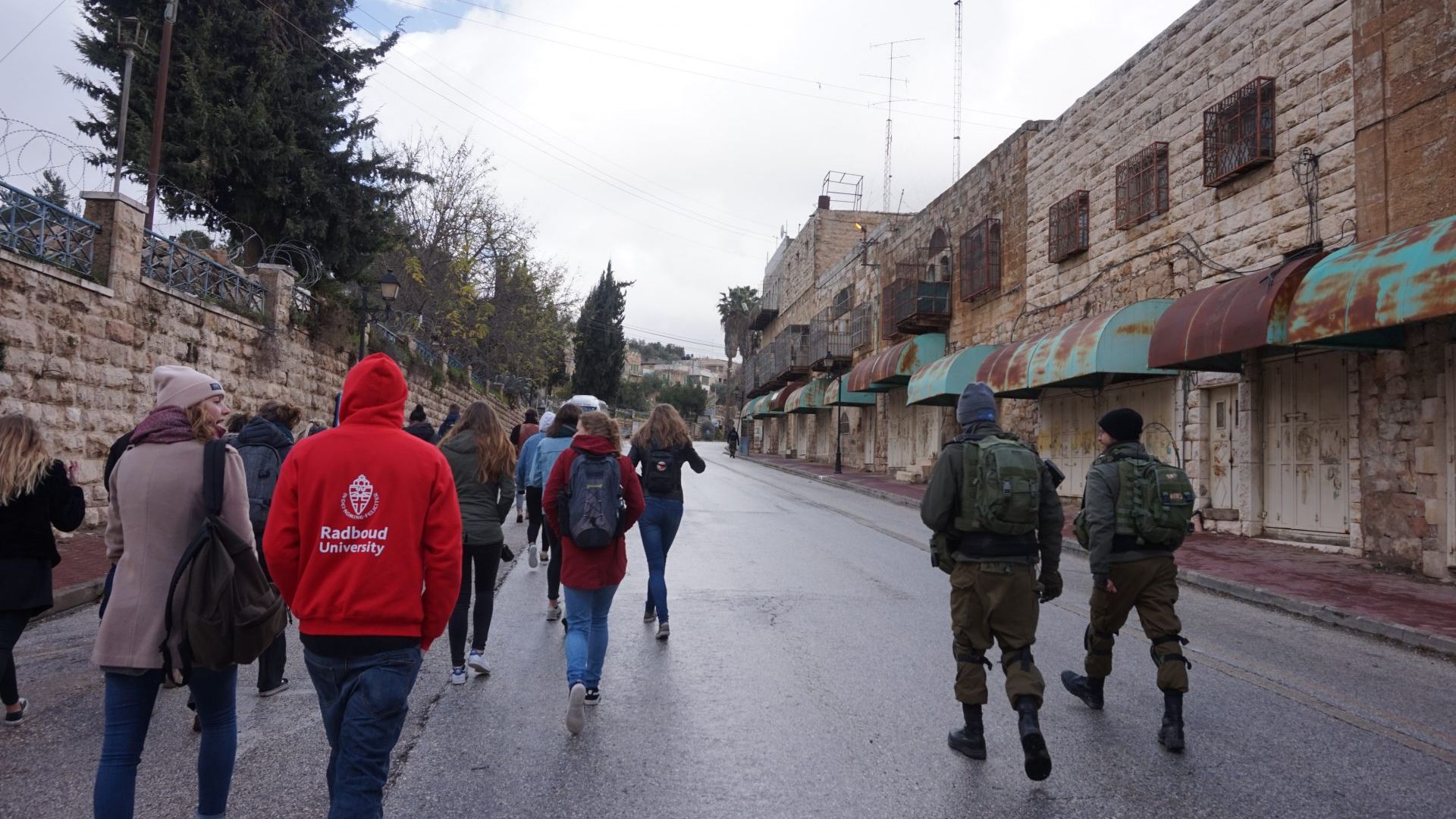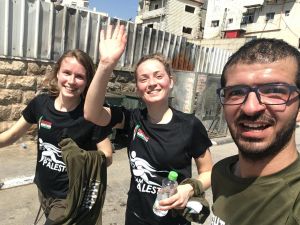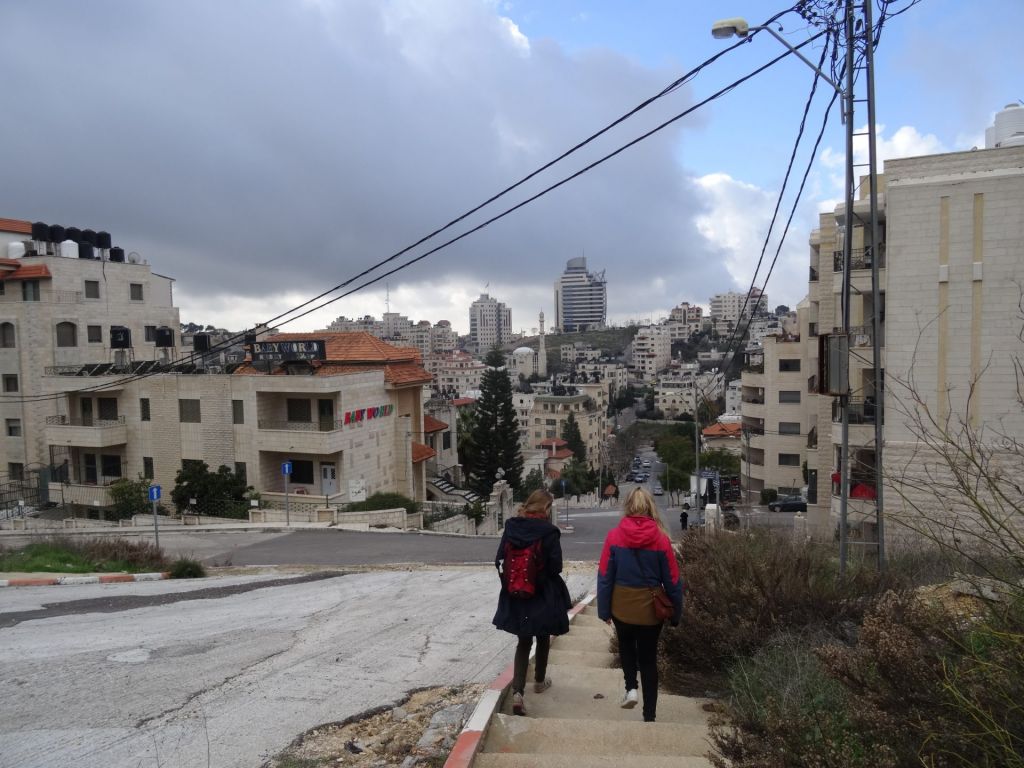Former student was in Palestine at start of war: ‘It’s important to tell their story’
-
 The excursion of CTI in 2018. Own photo.
The excursion of CTI in 2018. Own photo.
Former Radboud student Marieke Martens has had a hectic week. She was on the West Bank when the conflict between Hamas and Israel flared back up. Soon after, she was repatriated by the Dutch government, but is left with mixed feelings. ‘It is so unfair how the Palestinians are being treated.’
The word that alumnus Marieke Martens (30) chooses to describe the past few weeks is ‘unreal’. She was on the West Bank in early October when the conflict between Hamas and Israel was reignited. A few days later, she was sitting safely back home on the couch in the Netherlands, watching the war escalate from afar.

Martens wants to talk about her experiences, but emphasises that it’s not about her. ‘My Palestinian friends over there tell me that it is important that the rest of the world hears about their daily oppression. Their social media are being monitored and they always run the risk of being arrested, making it hard for them to come forward.’
Excursion to Israel
Back in 2018, Martens travelled to Israel ss part of her master’s course Conflict, Territories and Identities. Several visits to the West Bank were part of the itinerary. ‘Of course, I had read papers and articles about the situation beforehand, but walking around and talking to the people there was a completely different experience. That really showed me the oppression that Palestinians had to deal with from Israel.’
‘But the most absurd part of the journey was that our hotel was located in Tel Aviv. By day, we visited occupied territories, where we saw how the people were being oppressed. And at night, we were back on the beach, as if nothing was wrong.’
‘You could hear dull thuds in the distance; the sound of missiles coming down’
Her experiences on the trip did ignite a passion in Martens. As part of her graduation, she interned at the Dutch representation in the Palestinian Territories (a kind of embassy, eds.) in Ramallah. During her internship, she lived in the city for six months. ‘It was a great opportunity to experience real life there. I met a lot of interesting people, and I made a lot of friends.’
In the following years, she stayed in touch with those friends—and even went back a few times to visit them. Martens went back to Israel and the Palestinian Territories in early October, where she was set to take Arabic language lessons in Hebron (West Bank, eds.) for several months. That was the initial plan, at least, until the conflict flared up again.
Daily activities
‘I was staying with a family near Hebron. They were all fairly calm, given the circumstances. The TV was set to the news 24/7, but there was no sense of panic’, Martens says. ‘That might sound crazy, but there’s always tension, so people do their best to carry on with their days. However, I did contact the Ministry of Foreign Affairs, just to be safe.’
‘My family was worried for my sake, but at no point did I feel unsafe’, the woman from Nijmegen continues. ‘However, you did hear jets shooting past at night. And sometimes you could hear dull thuds in the distance; the sound of missiles or bombs coming down.’

A few days later, Martens received a message from the embassy: if she reported to the airport in Tel Aviv, she could be repatriated. ‘Even getting there was an ordeal because the Israeli military had locked down all major traffic arteries in the West Bank. And entering Israel with a Palestinian licence plate is generally impossible. In the end, a family friend got me to a checkpoint via several backroads; once there, I was picked up by an acquaintance from Jerusalem.’
After travelling half a day for what would normally be a 1.5-hour trip, Martens arrived at the airport. Once there, she got on a plane, landing in Eindhoven in the middle of the night. ‘There was a buffet waiting for us in the Netherlands and Red Cross members to offer support.’
Different world
‘It was a whole different world’, Martens says, shaking her head. ‘Of course it’s great that the government was so quick to repatriate people in an emergency, but I felt very uncomfortable leaving my friends behind. I could simply go back to the Netherlands where it’s safe, while over there, things keep escalating. It’s absurd to be in a completely different world in the course of one day.’
Her friends are doing well, given the circumstances. ‘But their fear and worries are ramping up. The Israeli army is arresting Palestinians en masse. Many former prisoners, for example, they fear that they might want to take revenge on Israel—even if there are no indications. But they’re also taking journalists and doctors. If people aren’t home, their relatives are taken as leverage. They’re only released if people come to turn themselves in.’
‘It’s important to realise that human lives are at stake’
‘A friend of mine is from Gaza. Her relatives’ house was bombed; fortunately, no one was home. Others had to find some place safe. I don’t know how they’re doing right now. We haven’t had much contact in the past few days.’
Martens is determined to help wherever she can, even if it’s just talking about the situation. ‘It is important that people understand the oppression of Palestinians are confronted with every day. We may get the news and read about the bombings, but it’s a far-off affair for most people. It’s important to realise that human lives are at stake; that Palestinian lives are no less valuable than any others.’
In the meantime, Martens hopes that international pressure on Israel ramps up. She has no idea how the situation will develop. ‘It’s such a complex issue. Things cannot go back to the way they were before. Hopefully, the two parties can start a dialogue. But a light at the end of the tunnel, a peaceful resolution, might take generations.’
Translated by Jasper Pesch



